International Day of Friendship meeting report
30 مرداد 1396The International Day of Friendship meeting was hosted by Salaam Global Foundation in association with Mahestan Institute and Managers of Iran Industries Association.
Greeting the members of the panel in the beginning of this convention, Dr. Alireza Moyeri, the head of the board of the trustees of SGF, introduced Dr. Mohammad Jafar Mahallati, Dr. Naser Hadian and Yasser Salimi. Thereafter, Yasser Salimi, head of the International Relations and Diplomacy Committee of SGF as the head of the panel asked Dr.Mahallati to start his speech. Dr. Mohammad Jafar Mahallati, Professor of Islamic Studies at Oberlin College, started his speech on manifest of friendship saying that 200 years ago no one believed that slavery would be abolished but in today’s world slavery is not accepted in any culture or political system. Martin Luther King, leader of the black movement in the US, wished that war would be vanished just like slavery. The ontology of friendship stems from philosophy and sociology. Man is supposed to discover the beauties of the creation which is the commencement of friendship. The question which arises is “why did God create everything in pairs?” The foundation for this is the creation of friendship and rapport. Knowing the nature of friendship in contemplation. Abu Ali Miskawayh said that the word “ Ensan” (human) stems from “ons” (getting used to). In the sociology of friendship, the empowerment is in question which belongs to the paradigm of power in which there is unconstructive rivalry and it is recommended endearment to be considered instead.
Religion paradigm is thanks centered and there is question of ethical religion or religious ethics. The basis for religion is to be ethical but as we have 25 ethical schools it should be clear what is basis for choosing one of them. The school should be chosen which is kindness centered and result of ethic is friendship. Kant liberal philosophy is self centered which is most important value. Freedom is not value but a coin for buying for things. Philosophy and friendship were same at first but philosophy nowadays justifies otherness and war. just war was emerged later and religions justified it. Hana Ardent says friendship is axis of democracy and democracy is friendship centered. Khaje Nasir Toosi says most important thing in society is equity. But equity is driven from dividing which result to eagerness and unity could not be driven from equity and justice. UN Charter is based on tolerance and peaceful co-existence while tolerance is negative. Neybur, American scholar has a book called beyond tolerance. For new UN charter there is need for paradigm shift. Imam Ghazali says friend is mirror of his friend and you can know everyone by knowing his friend. This principle could be used in international relations and need more research. Friendship is highest form of peace. Basic peace is absence of warm war. With war ethics we could have ceasefire. Cold war and cold peace could be solved by apology in international relations. Mandela and Gandhi made some steps in this way. Spain government apologized from Jews deported from this country in 2014. Peace literature is weak in Iran and friendship could be defined as an ideology. In Miskawayh theory of Imamat role of Imam is conserving peace entities in society. Justice is for basic societies. Ethical social life is not creatable. Shaykh Bahayee says there is no science rather than love. Keeping health is connected to social relations. Hojweiri says for Sufi being alone is death and friendship is a duty. Saadi consider whole globe as friendship area. In Arabic there more than 60 words for friendship and 70 percent of Mystical Islamic literature is in Persian.
Next speaker Dr. Nasser Hadian, Professor of International Relations in University of Tehran started his speech. He considered Dr. Mahallati speech as paradigm for good international community and added: our problem is less discussion about ideal conditions. He talked about de-securitizing international community toward Iran and described securitizing reasons first. He said: revolutions basically challenge current order and want to change it. The countries with more power which made the order will challenge them. US tried to securitize Iran several times but could not until former Iran administration it succeeded to show Iran is a treat for global peace and security and UNSC resolutions are an evidence for it.
When it happened the expenses for everything for Iran was raised. Expense for a normal economic transaction was raised. before UNSC reoltuins Iran was sanctioned but with no effect and from this time other countries join it. Before that Europe was against sanctions. So they understood that sanctions are effective. It was result of successful securitization.
About JCPOA I asked 3 questions. What we want? Why and at what expense? Most of critics do not make it clear what they want and only argue. Despite my critics I defended it since it has more advantages. Five result of JCPOA are these: Defeating strategic dead-end with defeat at one side and war on the other side. US now try hard to securitize Iran again. Second de-securitization and we are on this way. Third is normalization. In former administration an abnormal image of Iran was presented to the world. Iran negotiators tried to show a normal image from Iran and other thing is normalization of diplomatic relations. Fourth result is making opportunity to deal with regional problems since there is insecurity all around Iran and most dangerous is Pakistan which is not comparable to Iraq and Afghanistan. Before that all efforts were concentrated on nuclear issue. Fifth is suspension of sanctions expects some major banks many of problems were solved.
If Iran suspends JCPOA US will benefit. While Iran as a small power challenge a super power it is natural and has no relation with JCPOA. It is due to unequal power. In track 2 diplomacy we can make entities. In US people and entities are diverse and they don’t think the same way. Result of track 2 diplomacy is making trust which is basis for friendship. No basis for trust and friendship between Iran and US are made. Relations between governments are not an alternative for people relations and if it is not solved relations will not be deep.
In the end of meeting question and answer session was held and participants asked questions from speakers.
.
International Youth Day 2017 meeting report
30 مرداد 1396Around 18 years ago the UN General assembly declared 12 August as “International Youth Day” with the intention of building a better world with and for youth.
UN has requested all member states to provide the facilities and resources for the youth. This year theme for the International Youth Day was “youth building peace”. On this occasion Salaam Global Foundation held a meeting with presence of youth activists, scholars and thinkers.
In the beginning Dr. Mohammad Hosseini Manesh, Member of SGF BOT greeted the participants and introduced the program. Then Mr. Hamizdreza Haddadi, Vice-Chair of SGF Youth Committee presented the committee activities briefly.
After that the Panel on Youth, Dialogue and Peace started. Yasser Salimi, Chairman of SGF Youth Committee as chair of panel introduced panelists and asked Dr. Mazinani to deliver his speech.
Emphasizing on the importance of peace for everyone in the world, Ali Akbar Taj Mazinani the dean of social sciences Faculty of Allame Tabatabayi University said:” the Middle East is ravaged by war and radicalism and what we need more than anything else is peace.”
He pointed to the foreign and domestic treats which have inflicted Iran and added:”some of these treats are apparent and some are potential and we should not wait for the covert dangers to happen.”
He added:” we always witness that the youth are radicalized or influenced by it. He continued:” radical groups exploit the youth and majority of those who lose their lives are the youth while they can be leaders of peace.
Criticizing the political view on youth, the social science scholar added:” to understand the youth better, politico-cultural approach should be taken.” Regarding the meaning of peace he added:” there are two approaches to peace: negative and positive. Negative peace means absence of war and violence while positive peace emphasizes on absence of conditions leading to violence.
He added: In this approach to peace, justice, sexual equality, equal employment opportunities and decrease of corruption in society are main factors and their absence will tarnish peace and lead to violence.
In explaining social justice he said: social policy in fields of education, health, housing and welfare will lead to social justice and will make social security in people minds, in such societies people will trust official entities.
Pointing to spread of violence in Middle East he said: many of terrorists in the region are recruited by extremists groups due to lack of jobs.
Mazinani considered lack of criminal justice system as a reason for tarnishing peace and emergence of violence and said: we witness that prison as leading to extremism.
The university professor said youth role should be considered in social policy and added: concept of peace is absent in our policy making, in our country we need peace commanders in addition to war commanders since changing Iran image in international community is youth job and we should consider it in our public diplomacy too.
Criticizing education system as bases on memorizing he said: we should teach dialogue skills, problem solving, conflict resolution, mediation and communication skills since they are learnable. We need social approach to peace in our country to prevent violence.
The next speaker was Mohammad Nazifi, Head of Omid Iranian Foundation Youth Branch. He criticized mobilizing youth only for special occasions like elections but their capabilities should be used all the time. Youth demands are not limited to them and not meeting them will affect whole country negatively.
He added: Although there is little attention from policymakers to youth in national arena, we witness youth dominance in economic fields. Although there is no index for youth and we cannot talk scientifically on this issue, some of youth behaviors are shocking for politicians.
Last speaker Yalda Kkosravi, Head of Peace Studies Group in Tehran Peace Museum added to international documents on youth and said there is no special age defined for youth and added: each group of youth like young girls or disabled youth have special need which should be considered.
She said concepts of participation, development and peace are considered on different international documents and added: what leads to peace in communities is harmony and we should consider that absence of violence is not peace.
She said: teaching peace could not be one way and people should be engaged in learning. Learning should be driven from peace and volunteering is a way for engaging people but unfortunately it is not taken serious in our country.
She explained Peace Museum in engaging volunteers and emphasized on intergenerational relations to reach social policy goals.
International Forum of Young Poetesses report
Great Silk Way International Youth Union organized the International Forum of Young Poetesses on June 8-11, 2017. This year, the forum was dedicated to Khurshidbanu Natavan - one of the best lyrical poets of Azerbaijan. She was daughter of Mahdiqoli Khan, the last ruler of the Karabakh Khanate, and was most notable for her lyrical Ghazals.
International Forum of Young Poetesses is an international project implemented by the “Great Silk Way” International Youth Union and its member organizations. The Forum is aimed at creating a space for young and talented artists from the countries, historically connected with cultural bounds of the Silk Road, for self-expression, exchange and discussions on common challenges.
The 1st Forum was held on 26-28 April 2013 in Baku with participation of young poetesses from 20 countries. 2nd Forum also held in same city on 12-15 March 2014. The project was awarded as The Best Cross-Border Project 2013 in the category of “Culture” implemented in the Eastern Partnership region, within the framework of the Eastern Partnership Initiative’s Congress on 1-3 October, in Lublin, Poland
Salaam Global Foundation nominated Ms. Hajar Farhadi to participate in the forum.
In the opening ceremony attended by Azerbaijani officials, ambassadors and literature lovers, Fuad Muradov, Chairman of Azerbaijan National Assembly Youth and Sport Committee and Chairman of GSWIYU, Fuad Babayev, Head of Youth Department in Azerbaijan Youth and Sport Ministry and Farhad Hajiyev, Executive Director of Azerbaijan Youth Foundation made speech and then poetesses delivered poets in their native languages.
After the opening ceremony poetesses participated in workshops with Azerbaijani poets Nigar Hasanzadeh and Leyla Sharifeva was held in Nizami Ganjavi Museum of Literature.
Visiting Baku historical monuments and meeting with president of Azerbaijan Poets Association were also among programs.
Great Silk Way” IYU is an international non-commercial organization established to coordinate the activities of youth organizations and to represent and protect their common interests. The main aim and the scope of activities of the organization is promoting the intercultural and interreligious dialogue, create mutually beneficial collaboration, as well as to spread the idea of usage of the potential of youth for sustainable development among the Silk Road countries.
Young people from 28 Silk Way countries established the "Great Silk Way" International Youth Union, during the 1st Great Silk Way International Youth Congress, on June 27-29, 2012 in Baku, Azerbaijan.
Salaam Global Foundation in cooperation with Tehran Peace Museum and Non Aligned Movement Center for Human Rights and Cultural Diversity held meeting on World Day for Cultural Diversity for Dialogue and Development for discussion and exchange of ideas on cultural diversity, peace, dialogue and development on 25 May 2017. This meeting brought experts and scholars from different fields together.
In the beginning Dr. Alireza Moayyeri, Chairman of the Board of Trustees of Salaam Global Foundation introduced the program while welcoming participants. In few words he talked about his experience as Iran representative to UNOG and Human Rights Council. He believed that some human rights arguments about Iran are politically motivated.
After introduction panel on cultural diversity, dialogue and development started by moderation of Yasser Salimi, vice-chair of international relations and diplomacy committee of Salaam Global Foundation. Two other panelists were Seyyed Mohammad Hasani, Head of Non-Aligned Movement Center for Human Rights and Cultural Diversity and Yalda Khosravi, Head of Peace Studies Group in Tehran Peace Museum.
At first Yasser Salimi introduced two guests and motioned that as they are both PhD candidates in Law the discussion will mostly focus on Human Rights.
Then Seyyed Mohamad Hasani made his intervention on human rights and cultural diversity. He said there are two major approaches to HR, universality based on 1948 UDHR and relativism based on cultural and religious principles. He believed presence of African HR and People charter, European HR Convention, Islamic Declaration of HR and American HR convention shows there is no consensus on HR. He believed there is no much difference in these documents but Islamic HR Declaration is different and is based on ideology.
In World Conference on Human Rights declaration despite emphasis on human rights universality cultural diversity is also mentioned there.
He also talked about resolution on HR and cultural diversity and said it was not able to address serious issues. He added: different cultures have different understandings of HR and have strong reasons for them and main point is intercultural dialogue on this issue and UN has not set appropriate mechanism for that.
Then Yalda Khosravi made her intervention on HR and peace. She said different understanding of HR refers to unclear theoretical basis. She believed HR introduced in UDHR has four characteristics. Its subject is individual and protects it from government. It is an instrument not value and is a mechanism for peaceful coexistence. It is minimalistic and protects individuals with minimal standards. It is neutral from ethical point of view and has nothing to do with content of the right.
She added: concept of peace is mentioned in UN charter and UDHR preamble. In international law peace is goal but in peace studies it is not only absence of war but it’s a process. Every culture has an understanding form beauty and truth which could be used. We can know ourselves through knowing others therefore cultural diversity should be preserved.
She said main activity of Tehran Peace Museum is making a platform for dialogue and understanding and mentioned two projects for bringing young peace makers all over Iran and globally together.
After the interventions question and answer session started. Dr. Ali Hakimattar Head of Salaam Global Foundation BoD said it seems with growing of social media we witness unification of cultures and diversity is diminishing. Dr. Hosseini, Member of Salaam Global Foundation Trustees Board asked the panelists if economy is more important element here or culture. He made an example from US and KSA relations despite cultural differences. Seyyed Mohammad Hassani answered this shows the culture of these countries since another country with different culture will not do the same. In the end Yasser Salimi, summarized the discussions. He mentioned Salaam Global Foundation participation in World Intercultural Forum in Baku. He also introduced UN Alliance of Civilizations as a comprehensive mechanism for dialogue among cultures and civilizations and its focus areas like education, media and youth.
The World Forum on Intercultural Dialogue held biannually in Baku has taken responsibility for delivering the global agenda on the Dialogue among Civilizations adopted by the United Nations General Assembly (November 2001), the UNESCO Convention on Protection and Promotion of the Diversity of Cultural Expressions (2005), the Islamic Declaration on Cultural Diversity, which was adopted by ISESCO in 2004, Declaration and Action Plan of the Third Summit of the Heads of State and Government of the Council of Europe member states, the Council of Europe White Paper on Intercultural Dialogue (May 2008), as well as the Baku Declaration for the Promotion of Intercultural Dialogue.
In cooperation with UNESCO, UN Alliance of Civilizations, UN World Tourism Organization, Council of Europe, ISESCO, North-South Center of the Council of Europe 4th WORLD FORUM ON INTERCULTURAL DIALOGUE was held on May 5-6 in Baku, Republic of Azerbaijan.

Ilham Aliyev, President of Azerbaijan in his opening speech said goal of the forum is fostering dialogue among different nations. He mentioned to conflicts around the world and civil wars and violence in some countries in the region as concerning and said: human community needs dialogue and understanding more than ever and its realization could have positive effects on all fields.
Aliyev mentioned his country activities in promoting intercultural dialogue and said: 2017 is announced in Azerbaijan as year of Islamic solidarity.

Irina Bokova, DG of UNESCO also said destruction of cultural, historical and artistic heritage due to conflicts around the world is concerning.
She mentioned fostering of violence, Islamophobia and children deprivation from education and said: we should face to these challenges together and take meaningful steps.
Yasser Salimi, Deputy Chair of International Relations and Diplomacy Committee and Chair of Youth Committee of Salaam Global Foundation also participated in the forum. He attended in some sessions including "The emergence of new nationalism: How to prevent rising of populism and polarization", “Empowering youth to prevent violent extremism through education” and “The role of Cities’ policies in promoting dialogue among cultures” and discussed and exchanged ideas with the participants. While introducing Salaam Global Foundation he examined possible cooperation areas with other participants and their entities.



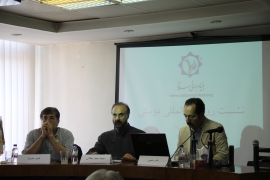
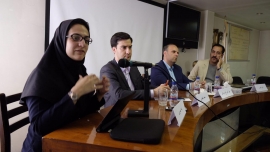
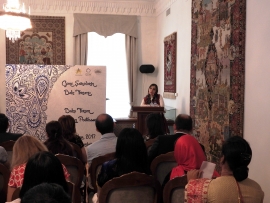
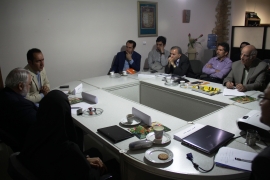
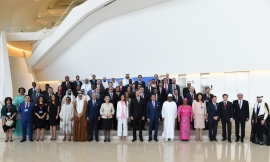
انجمن حامیان استاندارد